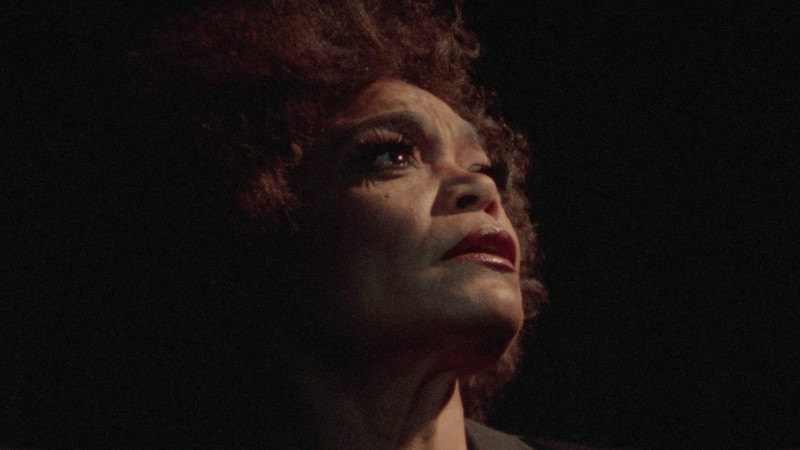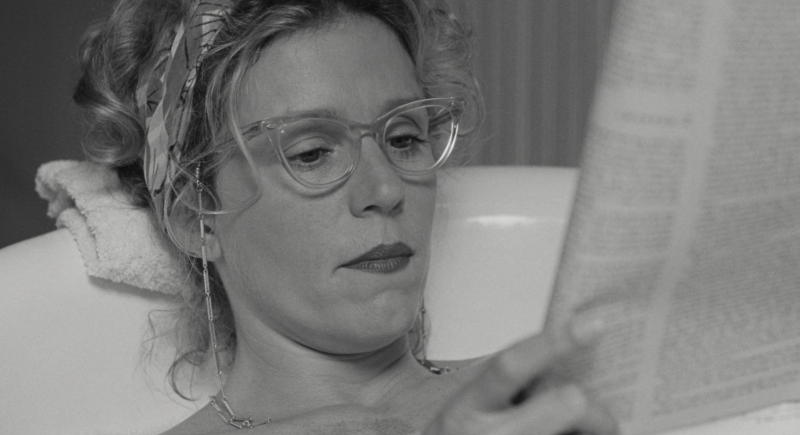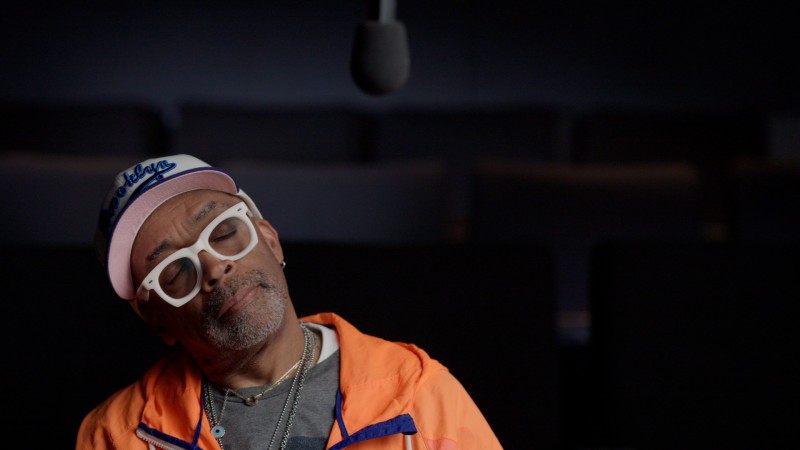Wendy shares her brother’s background, but she is all self-dramatization and neurosis. Late in the film, we see Jon teaching in front of a blackboard with the elements of dramatic and epic theater listed, aspects that could stand for the siblings themselves. The dramatic theater (what we might call traditional theater) relies on “emotion, sensation, suggestion,” while epic theater (the highly ironized and polemical form of meta-theater devised by Bertolt Brecht) is “thinking, argument, reason.” Laura Linney’s performance—one of her best—highlights this contrast. She brings an incredible warmth to Wendy, a warmth that is inseparable from the character’s neediness and insecurity. There’s a thrilling life to her work in the movie, because, in Linney’s hands, Wendy is constantly reacting to whatever the world throws at her, ducking and weaving in her attempt to find some dignity and love for herself. When she lies to Jon about getting a Guggenheim, we do not sense a diabolical mind at work, but rather someone backed into a corner simply trying to get her brother to say he’s proud of her.
Wendy is more humane and sympathetic than her brother, even as she defrauds the federal government, sleeps with a married man, and lies about her life to her brother. But the film provocatively suggests that Jon, who can blithely talk about institutionalizing their father and then, without skipping a beat, ask a bartender for more nuts, is the one who is needed to make the hard decisions. “Don’t make me out to be the evil brother who’s putting away our father against your will,” he protests. “We’re doing this together, right?” In one of the film’s few unsubtle gestures, Jenkins then cuts to the bar’s entertainment for the night, two elderly cabaret performers singing the Johnny Mercer and Bobby Darin duet “Two of a Kind.”
The sort of journey that Jon is on can’t help but come with the big emotional moments that we tend to associate with “good acting,” and The Savages has these. The scene that most resembles an Oscar clip depicts Jon losing it on Wendy in the parking lot of the nice nursing home to which she wants to move their father. “Right inside that beautiful building,” he yells, “right now it’s a fucking horror show! And all this wellness propaganda and the landscaping is just there to obscure the miserable fact that people die!” But while I love watching Hoffman go big, he’s far more interesting and more uniquely himself when we see his characters attempt to keep a lid on all the simmering chaos that threatens to spill out of them. “He could get overly emotional,” Greco said. “He always wanted to cry. We got very caught up in that when he was young, because he thought that’s what made him, and I’m like, ‘That’s your sentimentalizing of acting.’ He did not want to sentimentalize acting, but you had to push him.”
Lee Strasberg often emphasized how valuable suppression is to an actor. As Martin Landau, both a student and a teacher of the Method, explained, Strasberg wanted actors to “find the emotion, and find a way to allow it out, and then hold it back the way a character would, and if stuff leaks out, that’s what’s supposed to happen.” The Savages is filled with moments of revelation like this. When Jon is watching his sister bring their father out of the airport to his car, Hoffman’s gaze is first filled with loathing and impatience, before suddenly giving way to longing and grief that cannot be fully expressed. It doesn’t end in tears but with the effort to hold them back, which is always more interesting. When his sister asks him if the medication she’s found in his house is “for depression,” he responds that it’s “for cholesterol,” but the way he sits up as he says it speaks volumes about how annoyed he is.
My favorite example—one that’s lodged in my mental dictionary under the entry Hoffmanesque—comes quite early in the film, during yet another late-night phone call, one between Jon and Kasia about their breakup. Instead of giving us this entire conversation, or zooming in on Jon so we can see Hoffman’s emotional pyrotechnics, Jenkins smartly shoots the scene from a distance. It begins with muffled voices in the night, the camera tight on Wendy’s face as she wakes up in the motel room she is sharing with her brother. The indistinct murmurs coalesce as Jon says, “See you . . . don’t know if that’s something you and I could do . . . better if we don’t talk.” When the camera reveals Jon, it does so over Wendy’s shoulder, as she turns to quietly eavesdrop on him. We see him in deep focus in the background of the frame, glimpsed through an open door, sitting on a toilet, as if he lived in the saddest Dutch-master painting ever made.
Jon’s given circumstances (the need to avoid waking his sister, and the persistent stress of dealing with his father’s illness) pressurize the objective (his desire to get Kasia to stop calling him), and this in turn finds expression in his voice, which is not the low, sardonic mumble that was Hoffman’s signature but a pleading, high-pitched, broken thing. It’s the voice of someone who is trying and failing to find solid ground. If great acting captures something true about the human condition, it is moments like these that prove Hoffman was among the art’s best exponents.






